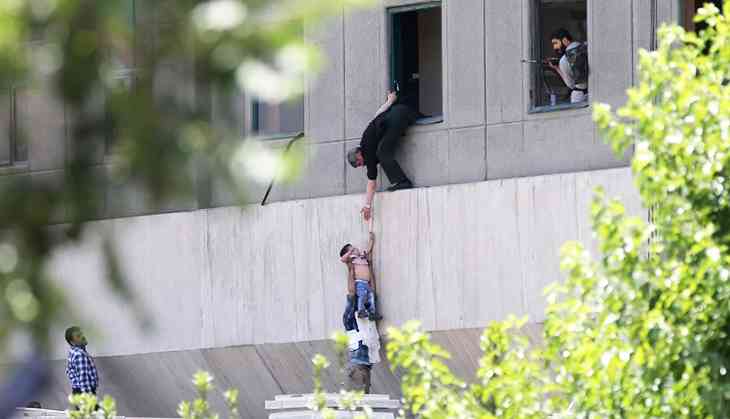At least 12 killed in Daesh attacks in Tehran. Iranians blame Saudis

Islamic State operatives, including suicide bombers, launched a coordinated attack on Iran's Capital Tehran on Wednesday, killing at least a dozen people and injuring more than 42 others, according to Press TV.
Two teams of highly trained terror operatives, armed with Kalashnikovs, grenades and explosive suicide belts, targeted Parliament and Ayatollah Khomeini's mausoleum, two important pillars of the Shiite theocracy, which 10-12 kilometres apart from each other.
This is the first time IS, also known as ISIS or Daesh, has attacked the Iranian capital. It is also the first terror strike in Tehran in more than a decade. So far, Iranian casualties in the war in Iraq and Syria were confined to its security personnel or volunteers involved in anti-Daesh operations.
Daesh, a radical salafist terror outfit, claims that Shias are heretics, and has been involved in multiple attacks on the members of the sect in Iraq and elsewhere.
Reports quoting Iranian intelligence officials claimed that the agencies managed to apprehend one team of attackers beforehand, averting more damage. It is still not clear what information came out of the arrested operatives, but some reports say the agencies may have had an inkling about the plot to target the Khomeini shrine.
Sequence of events
The attack continued through the day, as one team of attackers targeted Majlis, the Iranian Parliament, and reportedly took some hostages. One attacker is said to have blown himself up on the fourth floor of the building, while two others have been arrested, including one who had managed to escape the building but was apprehended later.
The attack started in the morning when, according to some reports, three to four attackers entered the Majlis disguised as women. The building is said to be undergoing renovation for enhanced security.
Iranian Deputy Interior Minister Hossein Zolfaqari claimed: “The assailants entered Parliament in women's dress and through the special gate for visitors, started the shooting spree and entered the area, causing fear and horror,” according to FARS, the semi-official news agency.
“In the first minutes of the attack, the Islamic Revolution Guards Corps (IRGC) forces entered the scene and gained control of the floor and main area of the Parliament building,” he added.
A few kilometres away, Ayat, Imam Khomeini's shrine, frequented by Iranians including the Supreme Leader Ayatollah Khamenei, came under attack, as three or four gunmen stormed the monument and started firing indiscriminately. One suicide bomber is said to have set off an explosion at the shrine as well, according to reports.
Blaming the Saudis
The IRGC has squarely blamed Saudi Arabia. In a statement, Deputy Commander of intelligence Hossein Nejat claimed Iran will taken revenge on Saudi Arabia.
"This terrorist attack happened only a week after the meeting between the US President and backward leaders who support terrorists. The fact that Islamic State has claimed responsiblity proves that they were involved in the brutal attack," Reuters quoted Nejat as saying.
The attack comes weeks after reformist Hassan Rouhani was re-elected as President. Rouhani has been credited for his efforts to normalise Iran's relations with Western countries.
The win was followed by US President Donald Trump's visit to Saudi Arabia where, playing to the gallery at the Gulf Cooperation Council, he accused Iran of supporting terror, and vowed to isolate Iran.
The visit set off a diplomatic upheaval, with all the major Sunni powers cutting ties with Qatar over its dealings with Iran, already a pariah state for the Gulf monarchies. The Saudis accuse the Qataris of punching above their weight, and have asked them to change their policies.
Recently, the Iranian government had moved the UN Security Council with a complaint in May over remarks by Prince Mohammad Bin Salman, who said the battle for influence between the Sunni Muslim kingdom of Saudi Arabia and the Shiite Iran ought to take place “inside Iran, not in Saudi Arabia”.
Saudi Foreign Minister Adel Jubeir, who is visiting Paris, said: “Iran must be punished for its interference in the region and support for terrorist organisations,” according to a report in Al Arabiya.
Iran a prime IS target
Iran has been a prime target for the IS. In August 2016, the Iranian intelligence minister had talked about how over 1,500 individuals were stopped from joining it.
Radio Free Europe/Radio Liberty, in a recent report, talked about a video released by the terror group in Persian, which asked the Sunni minority to rise against the Shiite Iranian establishment.
The RFERL report said since the video release, “IS has published four issues of its online propaganda publication Rumiyah in Persian.”
India reacts
India's External Affairs Minister Sushma Swaraj condemned the attacks on "institutions of democracy and spirituality in Tehran". In a telephonic conversation with her Iranian counterpart Mohammad Javad Zarif she offered condolences and expressed solidarity with the people of Iran.
First published: 7 June 2017, 18:11 IST
